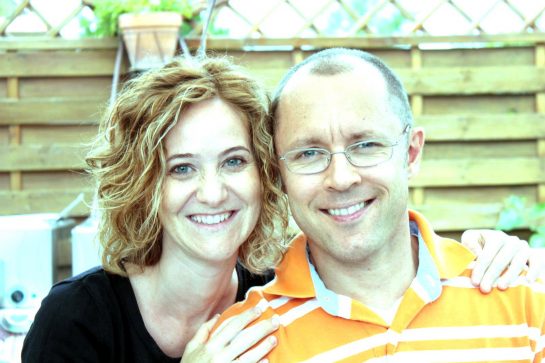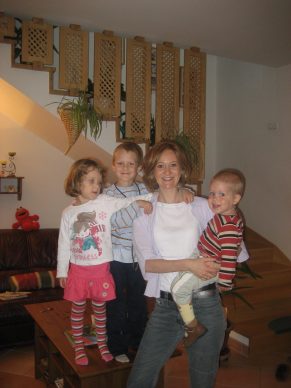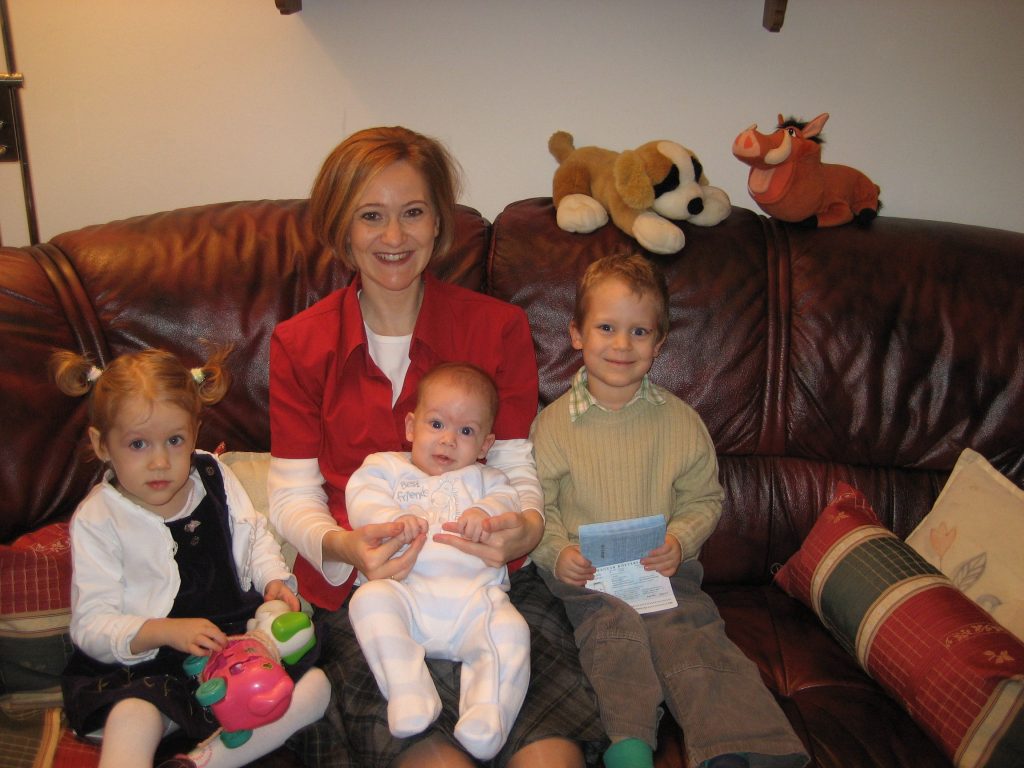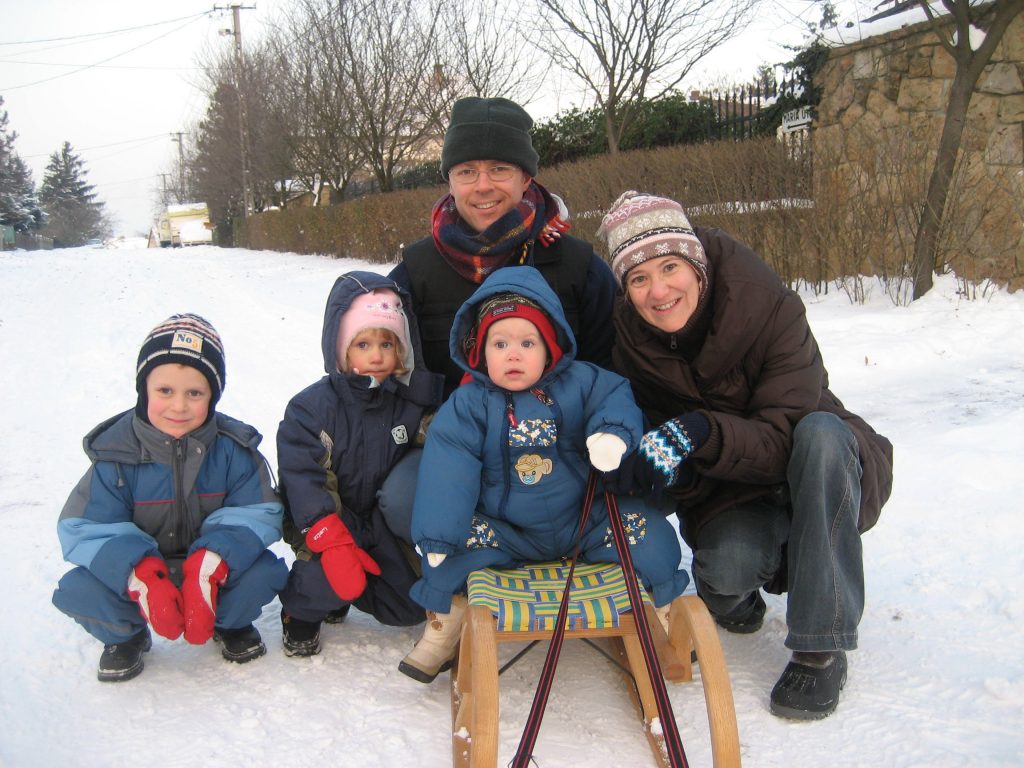At A Glance
Göd, Hungary, November 2010
Introduced to the gospel as a teenager in her native Hungary, Ildikó had to wait four years to be baptized due to her family’s disapproval. Ildikó discusses the challenges of joining a community that is still small in Hungary, marrying another Hungarian member and raising her three children in the Church there. She expresses confidence in the Savior’s role as head of the Church, the practical and spiritual safety that comes from living by its principles, and benefits of raising her children in the gospel.
How did you find out about the Church?
My parents lived in Mátészalka and I went to high school in Debrecen. I lived with my grandparents during my high school education. I come from a faithful Catholic family. My parents had always taught me to be obedient to the laws of the gospel. We went to church every Sunday. It was the same with my grandparents. They were also faithful and good people.
One day (when I was sixteen) my grandpa came home with a brochure, which said that we could order the Book of Mormon, another testimony of Jesus Christ. Since my brother attended a Catholic high school, my grandpa thought this might interest him. So, we ordered the book and thought it would come by mail. To our great surprise two missionaries knocked on our door and brought us the book soon after we ordered it. As a teenager I thought, “Hmm. That was a pretty quick and handsome delivery!” We let them in and they started to teach us the gospel of Jesus Christ. We all thought it was neat and we always felt peace and comfort when the missionaries came.
Then one day they asked if we wanted to be baptized in the true church of God and learn more about the gospel. My grandparents and my brother decided not to. I, on the other hand, had this wonderful, peaceful feeling that I should be baptized. I had a great desire to learn more about the Savior and His church. I knew in my heart that all I could learn here was goodness and love. I knew I could only be a better person, a better child of my parents, a better grandchild, and most of all a better child of God if I followed the Church’s teachings, which are basically Christ’s teachings. I prayed and prayed every night. I liked to kneel down and pour out my soul to Heavenly Father. I wanted a clear answer to my prayers that this was what I should do.
But I was scared. Now when I think back I don’t even know why I was so scared. I knew my parents loved me very much and maybe I was afraid that I would disappoint them if I told them I wanted to be part of another church. I didn’t mention anything to my parents and I decided to go to both churches on Sundays (LDS Church in the morning, Catholic Church in the evening with my grandparents). My grandma even told me one time: “You’re gonna be a saint. You spend the whole day listening to the word of God.”
After two years when I turned eighteen, I finally had the courage to stand in front of my parents and tell them that I wanted to be baptized. My dad got furious and said, “I won’t let you belong to any sect! Period.” We both started yelling and I’m sure the Holy Ghost wasn’t with us at all. I remember I packed my stuff and went back to Debrecen right after our awful and useless fight. I knew I needed to be baptized to grow more in faith but I also wanted to an obedient child of my wonderful, loving parents, so again I decided to please my parents and kept postponing my baptism. But it didn’t stop me going to the “Mormon Church” on Sundays.
When I was nineteen, I had an opportunity to be a nanny in New Jersey, where I got in contact with the Church and attended the meetings every Sunday. I stopped going to the Catholic Church while I was there. I kept learning more and more about the gospel and the teachings and the way the Church works and my testimony kept growing, too.
After I came home, my first thing was to get in contact with the missionaries and ask them to have the discussions with me again, so I could be absolutely sure that I was doing the right thing if I got baptized. When a missionary told me, “Ildikó, you have an opportunity now here on earth to be the follower of Christ and be baptized in His church,” I had a crystal clear answer to my prayers, as if Heavenly Father had whispered into my ears: “You must be baptized. Can’t you see? Make a decision and I will ease your mind and lift up your soul!” So, when the missionary asked, “Will you be baptized?” I said “Yes.” (Actually, since I was said to be an eternal investigator, the missionary said: “Ildikó, this is a serious thing. Don´t joke with us.” They thought I was joking when I said yes.)
After four years of being “only” an investigator, my baptismal day was such a precious day of my life. I will never forget it. For four years I had this dream that my parents would come to my baptism. They weren’t there, but Heavenly Father made sure that I would feel peace and comfort on that special day. It was all perfect. I was baptized in 1995.
A year later, I sat down with my dad and told him I was a member of the Church. A lot of fasting and prayers preceded the day of our visit. I got an assurance from Heavenly Father that everything would be just fine and I shouldn’t be scared to tell them the truth. Dad was calm and we had a wonderful talk. He said he knew that I had been baptized. He wanted to know why I finally told him after one year. I said, “Because you are important to me and I want to share my happiness with you. How can I be fully happy if those I love the most don´t know about what´s most important to me?” He accepted my decision. My whole family did. They still keep a good distance from the Church but my relationship with them hasn’t changed a bit. We love each other dearly and I know that someday–maybe not in this life–they will also be brave enough to recognize the light in the true gospel.
What was it like, being a new member of the Church in a place where the Church is still fairly new?
It’s very difficult to be a new member of the Church because all of a sudden, a lot of the things that were natural to you, like, let’s say, not buying a ticket when you get on a bus, or not cheating on a test, no longer seem okay. Before I joined the Church I only thought that big sins–like big spots on clothing–mattered, but little ones wouldn’t. Actually, I thought you could forget about the little things. But all of a sudden, you just start realizing that your little sin is a stain; it’s like a small dirt spot on white clothing–it’s still dirty. That’s why on the one hand it’s difficult to adjust to these new standards, but on the other hand, this is the only way that you can say yes. I tried to be Christ-like. That´s why I think a lot of new members, first they get enthusiastic, and then they find out that, oh, I’m doing this and this isn’t right and I’m doing that, too, and that isn’t right. If you can´t handle it and you can’t change for the better, it´s easier to be rather inactive. But this is the one thing that I think differentiates our church from others; it’s much more about the subtle things, the little things that you have to change in your life to be more Christ-like–not just about whether you kill someone or not, because it´s easy not to kill anyone, but it’s not so easy not to work on Sundays or not to spend money on Sundays when everyone else does. Once you realize this and make it a habit it becomes easier and easier.

I always say I have two important things in my life: enthusiasm and endurance. You have to be enthusiastic about the Church and God and the teachings and the gospel and the scriptures and the temple, because if you´re not enthusiastic then you won´t continue to stay here. Once you’ve got this enthusiasm, then you need to endure. For example, since I work with the kids, it sometimes seems useless to go to church. For six years I´ve been in the Primary on and off, and I cannot tell you the last time I was in Relief Society or Sunday School. You know you make an extra effort on Sunday and get up earlier and prepare the clothes, and I´m thinking, what did I gain from this Sunday? Most of the time, I have to tell you, I don´t gain anything. I don’t do anything different than I do at home, only with more kids. But you have to appreciate what you have at the moment, even the things you don´t like, because this time won´t last forever. I know this time is going to be over sooner than I think and I can be active again in Relief Society or Sunday School.
Here’s the other thing: you have to forget about relying on others–if you want a spiritual experience, you have to “create” it for yourself. You can´t always expect Sundays to be the most uplifting days or times of your week. If you go to church with expectations, you will go home disappointed; but if you go there with enthusiasm, then you come home renewed. When I hear my six-year-old’s accounts of his learning in Primary, I know he´s growing in faith and I know right then it was oh, so worth going to church.
I also think that you have to grow up to these things. At age 20, 21, you think differently than later when you’re closer to 30, plus being an eternal investigator I could see more clearly what the Church was all about.
Growing up in Hungary, most people have this mindset that there’s their life and there’s the Church somewhere else. But our church doesn’t work like this. You live in the Church, you live with the Church teachings. The Church belongs to my life; it´s not a separate thing anymore. All of a sudden you start thinking about the Church not just as something distant, or as a concept; all of a sudden the concept becomes a reality, and you realize that, “Holy cow! Do I really belong to the Church of Jesus Christ?” And if you think of this, if you think of the Church like this, that this is Christ’s church, you can’t just say this is a concept far away from me. I can’t imagine my life without the Church. It´s not just the structure of it, but it´s Heavenly Father. I couldn´t learn more about Heavenly Father and Jesus Christ elsewhere than in the Church.
I know that you married in the Church. How did you meet your husband?
In 1999, I was an English major at a university in Debrecen, and in my last year I decided to write my thesis on Mormonism. I applied for a scholarship and I got one to USU (Utah State University). The scholarship was for one semester. Not too long after I came home I was sure this was it, I wasn’t going to get married, I was just going to be part of the ministering of angels.
Shortly after that (in February, 2000), there was a district conference in Budapest, which I attended. A mutual friend introduced me to Laci (pronounced Latsi), my husband. Laci was a relatively new member of the Church then, because he was baptized in 1999. After the meeting, this common friend called me and asked what I thought about Laci. I told him, “Well, I like him. He’s nice. Finally I’ve met a smart guy in the Church, somebody who doesn’t have depression problems, who has a job and went to school–someone who seems normal.”
Then my friend told me that Laci had fallen for me. A couple of days later I got a phone call from Laci and I was so relaxed–I thought, this guy already likes me so I don’t have to worry about what I say. I don’t have to act like I’m more than I really am. After we’d dated more, we found out that this common friend told Laci the same thing, that I’d fallen for him. That’s why we were so comfortable talking on the phone for the first time.
After six months, he proposed, and I said, “Oh, I’m just too young.” To be honest I’m very scared of making commitments. I just questioned my maturity and I said, “Let’s wait a little bit. Let me find a job in Budapest so we can be closer instead of seeing each other once every two weeks.” I just wanted to make sure this was what I wanted. So I looked for a job and I moved and we saw each other more, almost every day.
I think, at age 26 you’re mature enough to use both your heart and head when you decide to get married. I wanted to be in the Church forever, so I figured I had to find someone who was strong enough in the Church. Now here was this guy who just barely got baptized and then went to the temple. But the fact that nothing was shocking for him in the Church, or that he never doubted things, made me realize that our marriage was the right thing. Our civil marriage was at my parents’ place in Mátészalka in July 2001, and we got married in Spain, in the Madrid temple, a week later.
How has being a member of the Church influenced your marriage?
I really like that my husband has always wanted to follow the counsel of the person who sealed us. The sealer told us, first, that we should never go to bed if we have bad feelings towards each other. He also said that we should always pray together and never yell at one another. Praying together is so essential. You can almost look into the other person’s head when you listen to his or her prayer carefully. It’s the same with the children. I love to listen to their prayers, not just because it’s cute but because it´s amazing what’s in their head and you find out things that otherwise you wouldn’t have an opportunity to find out. I think prayers are wonderful.

When you’re single and you go to church regularly and if you really listen to the teachings, the teachings of old and recent prophets, you have a very clear picture of what you’d like to expect in a marriage. Then, if you follow those lessons, you don’t say, “Oh, it’s still okay if he’s lazy.” “Oh he’s not reading the scriptures, but it’s going to change when we’re together.” I never believed in these things.
I’m not saying that our marriage is perfect or that our family life is perfect–it’s definitely not. You know, sometimes people, especially young women, in the Church come to me and say we´re a “holy family” –oh, I wish! It’s a very good thing to have your faith in the right place; you can turn to your faith and the teachings of the gospel and it’s always there for you. We have our ups and downs in our marriage, as well, but I think it’s really a great blessing that both Laci and I have the same goals. When we have difficult times, it’s just wonderful to have something stable in the home and the stable thing is your faith and the Church. You both know where you should turn to and you turn to that way and you get out of any difficult situation. We know that because we have our endowments, we want to get out of any slump, and we turn to God again. I love that.
The Church has also helped our marriage in practical ways. Just recently my husband was out of job for a longer period of time. Thank goodness we are both good savers. I think our saving comes not just from watching our parents, but also from following the teachings of the Church, because this is what you hear in the Church all the time–that you need to be prepared. Even when my husband earned relatively good money, we still didn’t spend more. We felt gratitude, thanked Heavenly Father, and saved money for worse times. We thought, the kids don’t need big things; we don’t need to go to Hawaii from here to have a nice vacation–the Balaton (a lake in Hungary) is perfect. Oh, we were surely grateful and happy to have those savings, otherwise we would have been in a big trouble. It was difficult to see that there was no money coming in, just going out, but because we had saved when we had the opportunity we didn’t feel hopeless.
What is it like raising your children in the Church in Hungary?
We have three children: Barnabás, Julcsi, and Tomi.
I like that talking about the Church, God, and Jesus Christ are so natural to them. Secularism is all around us. People don’t like to belong to a church, they don’t want to follow standards. They want to set their own standards for themselves. If my children see someone smoking, my oldest child asks, “Do they know God?” I say I don’t know, and he says, “I don’t think he knows God because he smokes.” It’s great to see how they store the teachings of the Church in their heads.
The Church is growing in Hungary and I’m hoping they will have friends in the Church to do lots of activities together and they will see other non-member young people, as well, and will see the difference. They are still very young and want to follow their parents’ teachings, and I have to admit I still wonder sometimes what it is going to be like when they become teenagers and face peer pressure.
It always seems easier to look at the Church from a distance than to be in it. But once the doctrines and correct behavior become habits, everything goes in the right place. You have to be consistent in everything. I admit that we´re horrible at doing family home evenings. For us, it’s something we have to work on. You have to be consistent when it’s about going to church, as well. The children got used to getting up early on Sundays. It takes us about forty minutes to get to church by car. The meetings start at 9 am, so everyone should be up by 6:30 at the latest to get ready for church.
As parents our role is to do our best and give the most we can: we have to love and nurture our children physically, mentally, and spiritually. I do not want to look back with fear of regret. I’d like to think back and say, I’ve done all I could to teach these children the gospel of Jesus Christ to help them learn and find out for themselves, as well.
At A Glance
Kovács Ildikó
 Location: Göd, Hungary
Location: Göd, Hungary
Age: 35
Marital status: Married
Children: Barnabás (6); Julcsi (4); Tomi (2)
Occupation: full time mother at the moment; graduated as a teacher of English, also a translator and interpreter
Languages Spoken at Home: Hungarian
Favorite Hymn: “Sweet Hour of Prayer”
Current Calling: Nursery
Interview by Rosalyn Eves. Photos used with permission.
At A Glance


